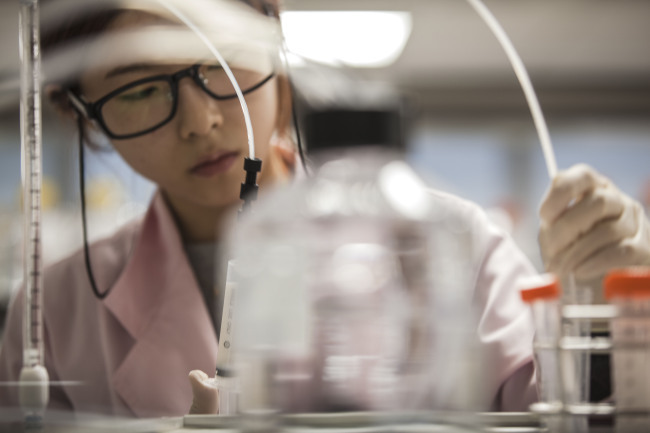As Samsung Electronics Vice Chairman Lee Jae-yong becomes a board member, taking greater control of the South Korean tech giant, he shoulders a daunting task -- ensuring the future sustainability of Samsung Group.
The world’s biggest maker of smartphones and chips is seeking leadership in new, promising industries that could supplement -- or even replace -- its flagship electronics business which is facing tough market competition and stagnant growth.
Continuing along the path laid out by his ailing father, Lee Kun-hee, Samsung’s heir apparent Lee Jae-yong appears to have narrowed down his future bets to two key areas -- biopharmaceuticals and automotive components -- while also prioritizing software development to strengthen the firm’s main electronics business.
While making bold investments for the future, the younger Lee has also been streamlining the 78-year-old conglomerate to make it more compact by offloading assets deemed less profitable or out of line with the group’s core businesses, such as its chemicals and printing units.
 |
A Samsung Bioepis employee is seen in a research lab at the company’s headquarters in Songdo, Incheon (Samsung Bioepis) |
Future lies in biopharmaceuticals
Lee Kun-hee famously said in 2010 that “biopharmaceuticals are the future of Samsung,” calling the field both “promising” and “beneficial to humanity.”
Since then, his son Jae-yong has been working to realize what his father had envisioned for his business empire before falling into a coma after a heart attack in 2014.
Led by the growth in aging populations around the world, the global biologic drug market is expected to surpass $390 billion in sales by 2020, taking up almost a third of the global pharmaceutical market by value, according to the IMS Institute for Healthcare Informatics.
Eyeing the vast market potential, Samsung has so far invested at least 3 trillion won ($2.6 billion) into its biopharma units Samsung BioLogics and Samsung Bioepis.
The former, founded in 2011, is a contract manufacturer of biologic drugs developed by global pharma companies. The latter, established as a subsidiary of BioLogics in 2012, develops biosimilars, or near-replicas of complex biologic drugs that have lost patent protection.
Samsung BioLogics currently operates two plants which manufacture commercial biologics ordered by its clients Bristol-Myers Squibb and Roche. The completion of the third plant in 2018 will drive up the firm’s net production capacity to 360,000 liters, the biggest in the business globally.
Its stated goal is to raise 1 trillion won in revenue and 400 billion won in operating profit by 2020, with plans to double its performance by 2025 by expanding its production capacity and scoring new orders from clients.
Meanwhile, Samsung Bioepis is working to commercialize its biosimilar drugs referencing some of the world’s top-selling drugs including Amgen’s Enbrel, Johnson & Johnson’s Remicade and AbbVie’s Humira, aiming to steal away a portion of the high profits enjoyed by the drugs’ original makers.
While acknowledging the novelty of Samsung’s biopharmaceutical drive, some critics have raised concerns over its profitability, long-term sustainability and lack of innovation -- factors which will help gauge the success of Samsung under the younger Lee.
“Samsung BioLogics merely makes drugs on behalf of other companies. Even as it scales up production, the amount of profit it can reap as a CMO could be limited,” Cha Ki-tae writes in his book “Lee Kun-hee’s Samsung, Lee Jae-yong’s Samsung.
“This means it could take much longer than expected for Samsung to retrieve its initial investment costs and reap profits,” Cha said.
Others point to the fact that a contract manufacturing organization business is inevitably swayed by economies of scale.
For Samsung’s biopharma business, the threat lies in China, a country with a burgeoning biotechnology industry and ample resources that can rapidly catch up with, and even surpass, the quality and quantity of production.
“Samsung BioLogics may enjoy growth in the beginning stages. However, as soon as China starts pouring in resources into the biopharma CMO business upon seeing its profitability, it will be difficult to win,” said Yun Deok-kyun, an honorary professor of industrial engineering at Hanyang University and an expert on Korea’s corporate landscape.
Yun also pointed out that Samsung’s biosimilars business lacks innovation.
“Samsung does not possess new drug development capabilities. It is simply copying what others have produced, suggesting fundamental limits as a business,” he said.
Nonetheless, market expectations for Samsung BioLogics are higher than ever. The firm is preparing an initial public offering on Korea’s main stock market within this year to fund the continued expansion of its businesses, including that of Samsung Bioepis.
It plans to sell 16.5 million shares priced at between 113,000 won and 136,000 won apiece, raising 1.8 trillion won to 2.3 trillion won and valuing the company at as much as 9 trillion won.
 |
(123RF) |
Push into car components, new software Though less high profile, Samsung is also eyeing new opportunities in the automotive components business.
In December 2015, Samsung Electronics announced it would set up a new team dedicated to car parts for infotainment systems and self-driving vehicles.
According to Strategy Analytics, a market research firm, electronics components are expected to make up 50 percent of all the parts used to build a car by 2020, up from the current 35 percent.
When it comes to electric vehicles, tech firms build almost all of the needed parts, aside from the auto body and tires.
Samsung Electronics already appears to be moving in this direction through strategic acquisitions. In addition to acquiring dozens of startups specializing in futuristic auto technologies, Samsung acquired a 2 percent stake in China’s leading EV and battery-maker BYC Co. for $455 million, in July.
And now, the Korean tech giant is reportedly in talks with Fiat Chrysler Automobiles over acquiring its components unit Magneti Marelli while expressing interest in purchasing France-based audio equipment maker Focal.
The acquisitions, if successful, would create synergies with Samsung’s existing automotive technologies for smart cars. Samsung SDI already produces lithium-ion batteries and energy control systems for EVs, while Samsung Electro-Mechanics makes camera modules and sensors, key components of autonomous vehicles.
Meanwhile, the tech conglomerate is on the lookout for new, cutting-edge software technologies that can improve its flagship mobile services as well as advance its fledgling car parts business.
Among dozens of other startups, Samsung acquired mobile payment startup Loop Pay in 2015 and most recently acquired artificial intelligence startup Viv Labs founded by the creators of the Siri digital assistant available on Apple’s iPhones.
“Samsung Electronics is expected to actively seek leadership in the AI-based platform business, which would create synergies with its components business in the future as well,” said Hyundai Securities analyst Kim Dong-won.
By Sohn Ji-young (
jys@heraldcorp.com)









